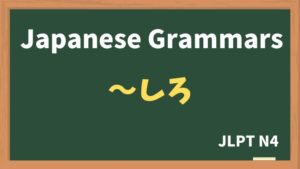
Explanation:〜な
fa-check-circleMeaning
"Don't 〜"
The expression 〜な is a Japanese imperative form used to give strong commands or prohibitions, similar to saying “don’t” in English. This form is direct and often blunt, making it commonly used in urgent situations, by authority figures, or among close acquaintances. Because of its straightforward nature, it can sound harsh or impolite depending on the context.
fa-check-circleForm
| Verb | masu form | prohibitive form |
| Group1 (U-Verb) | いきます かきます (iます) |
いくな かくな (uな) |
| Group2 (Ru-Verb) | ねます たべます |
ねるな たべるな |
| Group3 (Irregular Verb) | します きます |
するな くるな |
The prohibitive form is used to command a person not to do something.
Points
- Strong Prohibition: 〜な is used to firmly tell someone not to do something.
- Verb Form: The verb is in its plain form + な to create a negative command.
- Tone: The expression can sound strict or even rude, so it’s often used in specific contexts, like among friends, in urgent situations, or by people in authority (e.g., a teacher to a student).
fa-check-circleJLPT Level
N4
Sample sentenes
うごくな!
Don't move!

さわぐな
Don't make a noise.
はしるな
Don't run.
さわるな!
Don't touch me!
明日は、おくれるなよ。
Don't be late tomorrow.
「ここで泳ぐな」と 書いてあります。
It says, "Do not swim here."
「ゴミを捨てるな」と 書いてあります。
It says, "Do not throw trash away."
Vocabulary
| Japanese |
English | |
| 動く | うごく | to move |
| 騒ぐ | さわぐ | to make a noise |
| 触る | さわる | to touch |
| 捨てる | すてる | to throw away |






